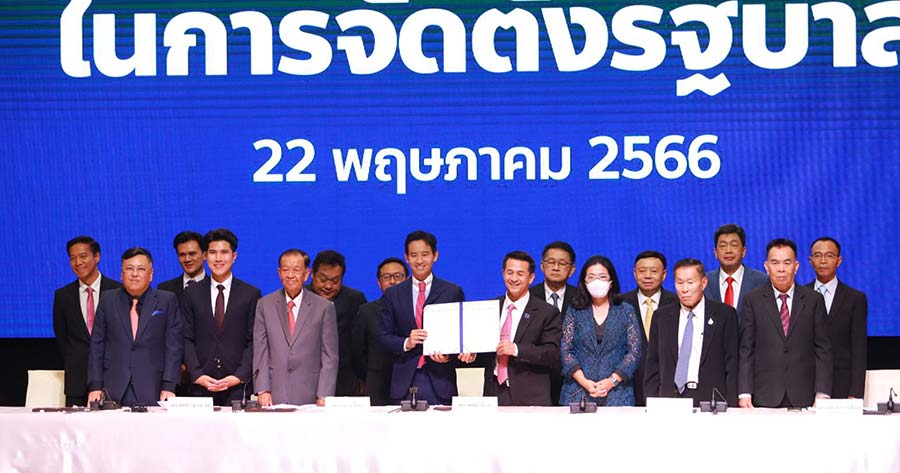The Thai progressive Move Forward Party on Monday officially signed an agreement to form the coalition government with seven other parties. The joint MOU included draft a new constitution, end monopolies, and allow same-sex marriage, but did not mention a controversial proposal to revise royal insult laws, also known as Article 112.
MFP leader Pita Limjaroenrat called May 22 a significant date since it marks nine years since General Prayuth Chan O-Cha, now Thailand’s Prime Minister, staged the last coup.
It’s a peaceful shift in Thai politics, he remarked, and the new government is proof of that.
To lay the groundwork for forming a government and to work together, the Move Forward Party, Pheu Thai Party, Thai Sang Thai Party, Prachachart Party, Seree Ruam Thai Party, Pheu Thai Ruam Palang Party, FAIR Party, and Plung Sungkom Mai Party have signed a Memorandum of Understanding (MOU).
According to the 23-point agreement unveiled on Monday, all parties will cooperate in the following tasks:
- Restore democracy, including expediting the process of drafting a new constitution by a Constitution Drafting Assembly elected directly by the people.
- Affirm and pass the Marriage Equality Act to ensure equal rights for all couples, regardless of gender, without infringing upon the religious principles each individual adheres to.
- Push for reforms in the civil service, police, military, and justice process to be in line with democratic principles, considering transparency, modernity, efficiency, and maximising the benefits for the people.
- Transition from conscription to voluntary enlistment, except when the country is at war.
- Collaborate on the process of building sustainable peace in the southern border provinces, considering human rights, coexistence in a multicultural society, participation of all sectors, and reviewing the missions of agencies and laws related to security.
- Strive for decentralisation of power and budget allocation to enable localities to respond to the needs of their communities appropriately, efficiently, and without corruption.
- Combat corruption through the establishment of a transparent and open government system, disclosing state information in all agencies.
- Revive the economy by increasing people’s incomes, reducing inequality, and creating a fair economic system that promotes growth.
- Overhaul laws regarding people’s livelihood and subsistence, such as temporarily suspending or reducing unnecessary and obstructive permits, providing financial relief and support to small and medium-sized enterprises (SMEs), while focusing on GDP growth of SMEs, supporting industries, and strengthening Thai products to compete globally.
- Abolish monopolies and promote fair competition in all industries, such as alcoholic beverages, with the Prachachart Party reserving its right to disagree on the alcohol industry only, due to religious reasons.
- Reform the land distribution system by amending related laws, providing fair land distribution, resolving conflicts between state and people on land ownership, and reviewing cases resulting from the policy of forest reclamation.
- Improve the electricity production structure, pricing calculations, and appropriate production capacity to reduce the cost of living and ensure energy security.
- Establish a new budgeting system, emphasising the use of zero-based budgeting.
- Create a comprehensive welfare system from birth to old age, considering appropriateness and long-term fiscal sustainability.
- Combat the drug problem urgently.
- Reclassify marijuana as a controlled substance by issuing a Ministry of Health notification, with new laws regulating and supporting its beneficial uses.
- Promote safe agriculture and livestock farming, protect and maintain the benefits of farmers, and reduce production costs. Support marketing, access to technology, water resources. Encourage the formation of agricultural groups for production planning, protection of farmers’ benefit, and promotion of agro-processing industries to create economic value from agricultural production.
- Revise fisheries laws, eliminate obstacles, remedy and develop sustainable fishing occupations.
- Improve the rights of workers in all professions by ensuring fair employment conditions and remuneration that align with the cost of living and economic growth.
- Elevate the healthcare system to ensure that the general public has access to quality healthcare services in terms of health promotion, disease prevention, treatment, and recovery.
- Reform the educational system to enhance quality, reduce inequality, and promote lifelong learning.
- Foster domestic and international cooperation and mechanisms to address pollution issues, including the reduction of net greenhouse gas emissions to net zero as quickly as possible.
- Implement foreign policy initiatives to restore Thailand’s leadership role in Asean and maintain balanced international relations between Thailand and major powers.





